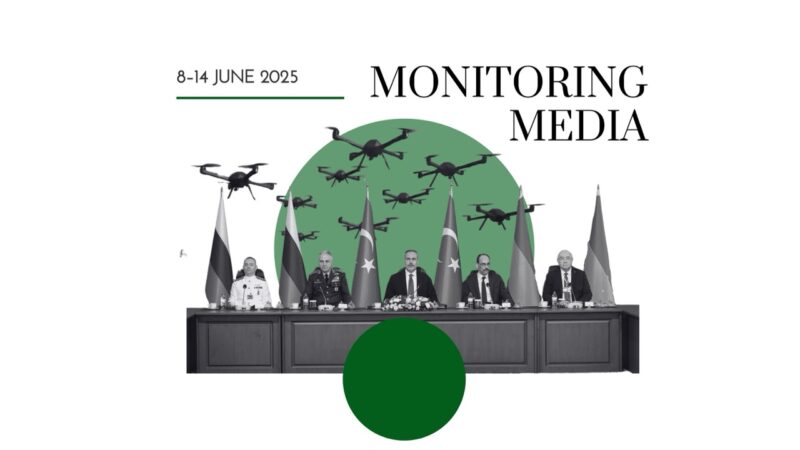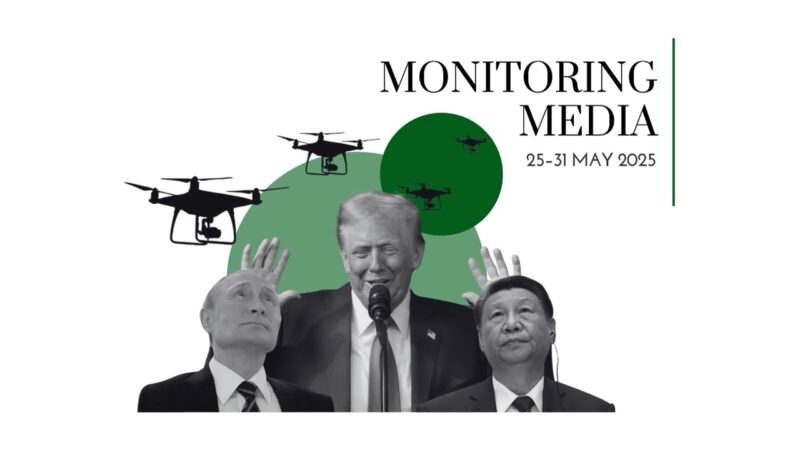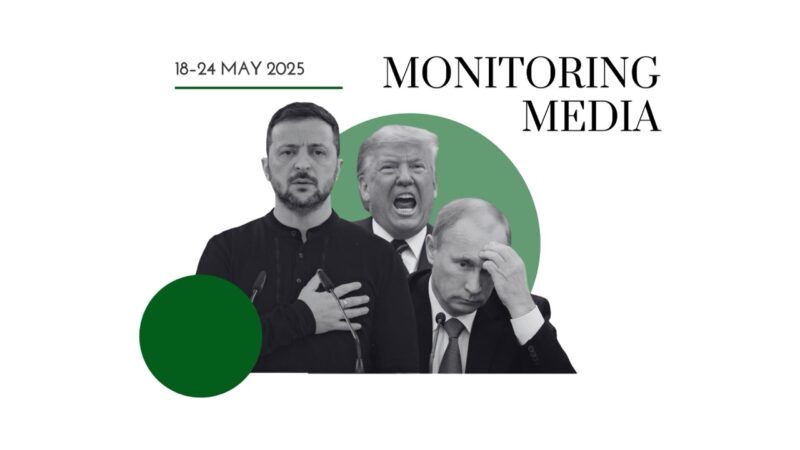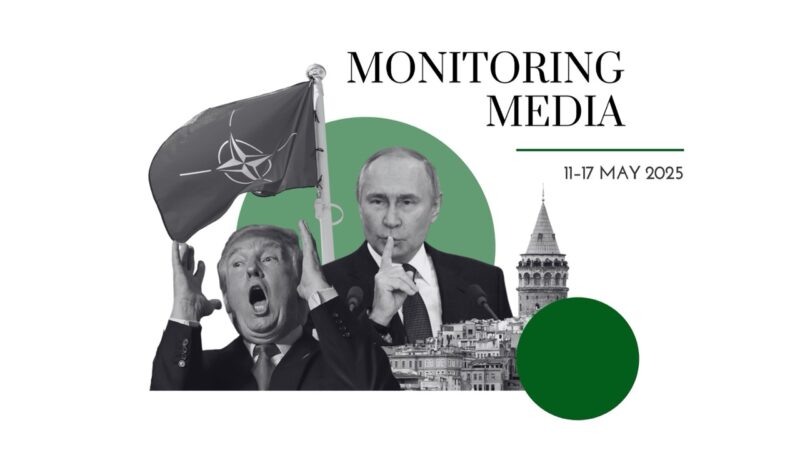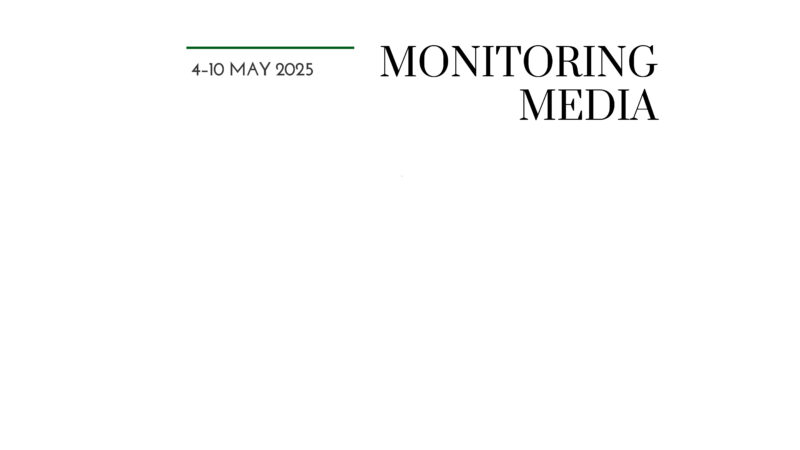Ukraine’s high-tech and improvisational warfare outpaces Russia’s

CIUS weekly report on media coverage of Ukrainian affairs, 15–21 August 2022
Four North American magazines (The National Interest, National Review, The Conversation, and The Economist) were selected to prepare this report on how the situation in Ukraine has been portrayed in the media during the past week (15–21 August 2022). The sample of magazines was created based on their impact on public opinion as well as their professional reputation, popularity among the readership, and topical relevance. These four magazines represent the conservative, centrist, and liberal political spectrums.
This report covers only the most-read articles about Ukraine, as ranked by the respective magazines themselves in the past week. It also covers promoted texts on home pages, texts from special sections on Ukraine, texts from paper editions of the magazines, and texts about Ukraine from opinion columns and editorials.
Topics featured in the selected articles:
- Ukraine at war: private satellite companies help Ukraine to fight the war; the liberation of Kherson may be trickier than planned; Oleh Sentsov exposes the putrid Russian state and law enforcement machine;
- The world and Ukraine: Russo-Ukrainian war not likely to end soon; brutal skirmishes in Ukraine’s cities are changing modern warfare studies; US has failed to satisfy its national interests in Ukraine; Western sanctions against Russia are not effective enough; Ukraine’s victory against Russia may help the West to deal with China; Poland continues providing support to Ukraine but has faced its limits;
- Russia at war: Russia exploits frictions in the Western camp in its efforts to win the war.
The most common arguments:
Ukraine shows the world how private satellites can be used to fight. Mariel Borowitz (The Conversation) claims that satellite imagery can make a decisive impact on the dynamics of war, as numerous cases from the Russo-Ukrainian war demonstrate. This imagery is well-suited for “informing both military planning as well as the public view of a war,” regardless of where the conflict takes place. Considering the growing numbers of multi-purpose space satellites that belong to private companies, the enhancement of cooperation between state and business actors seems to be inevitable. Particularly since February 2022 Ukraine has benefitted from such cooperation, as it could access large volumes of data in almost real time as well as bypass permissions from foreign government agencies to download classified information from their spy satellites. The US government encouraged such cooperation, aiming to reveal Russian aggression to the whole world. Apart from this, by sharing images of the Ukrainian Army’s territorial gains and/or shelling of Russian military objects, private satellite companies help to strengthen the resolve of Ukrainians to defend their country. Borowitz concludes that “some space experts have called the war in Ukraine the first ‘commercial space war’.”
Neither an immediate nor a postponed liberation of Kherson are advantageous for the Ukrainian Army. The Economist writes that the Ukrainian command pulled off an unprecedented achievement in contemporary warfare by inflicting enormous damage on a much more powerful army and halting its invasion. That said, recapturing Ukraine’s occupied territories, specifically the city of Kherson, will raise different challenges. According to The Economist, “Russia has been pouring troops into Kherson and digging in. Urban warfare is slow and costly for the troops waging it and the civilians in the way. Russia has captured Mariupol, Severodonetsk, and other Ukrainian cities because it had little compunction about destroying them in the process. But Ukraine would rather Kherson remained intact.” These and other factors will likely render Ukraine’s counteroffensive a protracted siege of the city. If such a scenario happens, international support for the Ukrainian cause may decrease with time: “Western governments may be nervous about maintaining public support for Ukraine as heating bills soar in the winter months.” Ukraine does not have much time for a counteroffensive, however, for reality may leave Kyiv with no other option except to wait and accumulate resources.
Oleh Sentsov defines his experience in Russian detention as a farce and “dark comedy.” Jay Nordlinger (National Review) writes a story of Oleh Sentsov, a filmmaker, political prisoner, and combat soldier whom he had a chance to interview. Sentsov, a native of Crimea, was detained by Russian security services on 11 March 2014 for delivering food and helping Ukraine’s soldiers trapped on the peninsula to escape. In the first 24 hours he was tortured and accused of false crimes. It took more than a year for his case to be heard by a Russian military court that considers terrorism cases. According to Sentsov, the charges were fake, the trial was a farce, and “everyone was playing an assigned, scripted role.” After the judge announced the verdict, Sentsov had to endure confinement in fifteen different prisons and labour camps. In one such camp, Labytnangi, Sentsov went on a hunger strike and demanded the release of all Ukrainian political prisoners in Russia. On 7 September 2019, Sentsov was sent to Ukraine in a prisoner swap. Since his release Sentsov has continued campaigning for Ukraine’s political prisoners and has directed new films. He changed his activities on 24 February 2022, joining the ranks of the Armed Forces of Ukraine in response to Russia’s invasion. Sentsov believes that “this war is not Putin’s alone; it is a collective responsibility. The blood of innocent people, including children, is on the hands of everyone who has supported Putin or stood by silently.”
Russo-Ukrainian war can last for years, with no side victorious on the battlefield. Michael O’Hanlon (The National Interest) claims that “with the Ukraine war entering its fifth month, the fighting has entered into a slow-moving slog. Tragically, there is no end in sight.” In this light, O’Hanlon encourages Western leaders to invent a “complementary strategy that recognizes the likelihood of a protracted grind on the battlefield” instead of delivering advanced artillery systems to Ukraine’s army in growing numbers. As a point of reference for the new strategy, O’Hanlon advises looking at the lessons of the First World War. The German advance towards Paris in 1914 resembles the Russian invasion of Ukraine today: the Germans managed to conquer some of the French territories within the first weeks of their operation, but then stumbled for years in a trench fight. Before the US intervened in 1918, both belligerents invested much effort in developing artillery, air, and sabotage forces with little to no effect. Therefore, O’Hanlon concludes that the Russo-Ukrainian war may last longer than any side currently anticipates. To find a solution to this war, both sides eventually need to negotiate, as even an unlimited supply of heavy weaponry will likely not change the stalemate.
Russo-Ukrainian war stimulates research on urban warfare. The Economist highlights that the fighting between Russians and Ukrainians in the latter’s cities requires a reconsideration of the rules of modern warfare. Before the wide-scale Russian invasion, it was common wisdom for the army command to avoid urban skirmishes whenever possible. However, heavy fights in densely populated regions of Ukraine are forcing military strategists to accept a new norm: urban skirmishes have become unavoidable today and will remain in future conflicts. To increase the effectiveness of armies in an urban setting, profound reforms should take place that embrace everything “from camouflage patterns and weapons to vehicle design and logistics.” These reforms will reflect the socio-political changes of the contemporary world, as fewer people continue living in the countryside while the number of megacities with over ten million inhabitants is on the rise. Urban skirmishes are known to be brutal and effortful: one building can occupy an entire battalion, civilian victims are unavoidable, some of the civilians are combatants in disguise, every doorway may be boobytrapped, ambushes around the corner have become common, fighting may shift to underground facilities, and contemporary tanks and missiles are not designed for surgical strikes. This said, with proper planning and execution the skirmish in the city might turn out to be even less destructive than a battle in open terrain: the fighting side which accepts the urban tactical constraints usually wins. Ukraine provides many useful examples in this respect.
US policies in Ukraine are doing more harm than good. Ramon Marks (The National Interest) argues that the US government has made several strategic and irreversible miscalculations on its Ukraine policies. Because of them, after the war is over “Russia will build closer relations with China and other countries on the Eurasian continent, including India, Iran, Saudi Arabia, and the Gulf states. It will turn irrevocably away from European democracies and Washington.” This will allow the Kremlin to challenge Washington’s global leadership and gradually isolate the rest of the Western world from mainstream international politics. Moreover, with their energy sanctions against Russia, Western states will further weaken their economic standing, increase the volatility of energy markets, and empower developing states to redesign the world order. Such a Western miscalculation will not be corrected easily, as two-thirds of the world’s population reside in states that are either neutral or critical of Washington. The only positive development for the West in its Ukraine policies has been the reinforcement of NATO. In particular, European states seem to be willing to invest more money in their security. Marks encourages maintaining this trend, as it will eventually liberate the US from the burden of being an irreplaceable NATO backbone.
Western sanctions are failing to curtail Russia’s aggression. Mark Episkopos (The National Interest) ventures a hypothesis that the Russian authorities have managed to mitigate the negative effect of Western economic sanctions. Episkopos provides data from the Russian federal statistics service, which estimated that the state’s economy “shrank by [only] 4 percent year-on-year over the second quarter.” At the same time, according to Episkopos, “the ruble became one of the world’s strongest performing currencies” in 2022, “parallel import” schemes were successfully introduced to provide Russians with Western-made luxury goods, consistent nationalization of Western brands (e.g., McDonalds or Starbucks) has allowed Russians to preserve their lifestyle, and developing states such as India and China have jumped in to replace the West in Russia’s foreign trade. Episkopos concludes that “Russia has so far largely managed to mitigate the pain from sanctions and is shifting its strategy in Ukraine from trying to quickly seize major cities to bleeding Ukrainian forces white in a grinding war of attrition.” At the same time, “Europe’s mounting economic challenges have reignited concerns that EU states could start peeling away from the Western sanctions regime.”
To bolster its China policy, the West should help Ukraine defeat Russia. Victoria Coates and Marshall Billingslea (National Review) argue that “there isn’t real cooperation between the U.S. and the PRC on Ukraine. There won’t be until President Xi Jinping fears he has more to lose than gain from bankrolling Putin’s murderous aggression.” In this light, to enhance cooperation with China on regional and global matters, the US and the West should implement a three-stage plan. First, sanction Russian banks and by rendering the ruble worthless undermine Russia’s export capacities and operations. Second, penalize every international actor that conducts any financial transaction with Russian banks. Third, communicate to India, China, and other developing states that bankrolling Putin’s regime will block their access to Western financial markets and institutions.
Polish citizens who help Ukrainians may soon run out of the money and energy to continue. Patrice McMahon (The Conversation) highlights that despite the millions of Ukrainians fleeing the war to Poland, she did not see any refugee camps there. Instead, almost all Ukrainians in need “are being housed by Polish citizens, and while most have applied for financial assistance, some Poles are covering the expenses themselves.” McMahon was also impressed by the Polish government’s generosity: “Ukrainians are able to live in Poland legally for 18 months, and the government is giving them access to the country’s social welfare system.” At the same time, the initially warm support for Ukrainians in Poland has started waning. Many Polish benefactors are at the breaking point: they cannot continue supporting Ukrainians financially, and they are mentally exhausted as well. That said, an uninterrupted flow of money between international organizations and private benefactors in Poland has yet to be established. If this doesn’t happen, the first refugee camps for Ukrainians may eventually appear.
Russia aims to exploit the fragility of Western unity on Ukraine to its advantage. Robert D. English (The National Interest) writes that “the rising costs of war appear less sustainable for wealthy, democratic EU countries than they do for poor, isolated Russia.” In particular, EU governments and societies need to embrace “soaring energy costs, rationing, reduced aid for the poor, and looming recession.” In Italy, this has already led to the collapse of the governing coalition and the resignation of Prime Minister Mario Draghi. In the US, this has prompted discussions of changing the strategy of support to Ukraine, as Russia’s defeat on the battlefield may become unrealistic. At the same time, the autocratic Russian government has demonstrated unexpected resilience: it swiftly designed an alternative payment system for exports, poured its massive cash reserves into the domestic market, benefitted from the increasing energy prices on the international markets, and swiftly replaced European energy customers with Chinese and Indian ones. English concludes that two scenarios of ending the war are equally likely: either a Ukrainian triumph in 2023 as long as the West remains supportive and united or Russia’s retention of “a major swath of Ukrainian territory while squeezing Europe through months of high inflation with severe energy and commodity shortages.”
Worth your attention:
Western sanctions against Russia are gradually containing the Kremlin’s aggression. In his analysis, Mark Episkopos (The National Interest) argues that the logic behind Western economic sanctions against Russia is based on three assumptions: that Ukraine can defeat Russia on the battlefield with Western support, that sanctions are weakening the Russian economy and threatening Putin’s regime, and that developing states will join the Western camp in its condemnation of Russia. Episkopos argues that none of these assumptions is realistic, and therefore, sanctions harm the West much more than they harm Russia. The necessity to maintain sanctions should be reviewed.
Episkopos seems to overestimate the military capacity, reserves, and efficiency of the Russian army. In their recent analysis of the dynamics of this war, Raphael S. Cohen and Gian Gentile (Foreign Policy) argue that the initiative is gradually shifting toward Ukraine: “While the outcome of the war is by no means clear, the balance of materiel, manpower, and willpower all seem to make the case for cautious optimism. Setbacks in the Donbas aside, the strategic balance still favors Ukraine. Although Ukraine is unlikely to throw Russia back to its borders any time soon, the war will likely trend in Ukraine’s favor in the coming months. But only if the West does not blink first.”
Indeed, Episkopos seems to be over-reliant on the data coming from official Russian sources when estimating the current healthiness of the Russian economy. The fact is that sanctions have already cut Russia’s energy exports, which is one of the key sources of filling its state budget. If Carole Nakhle (The Conversation) is to be believed, “since the war began, many western oil companies, which typically bring capital and technology, have exited Russia. In a country with complex reservoirs, ageing fields and a hostile climate, the lack of investment and access to technology will accelerate the long-term decline.”
In their turn, Jeffrey Sonnenfeld and Steven Tian (Foreign Policy) highlight that official Russian data is very unreliable and the state’s economy is imploding: “Defeatist headlines arguing that Russia’s economy has bounced back are simply not factual—the facts are that by any metric and on any level, the Russian economy is reeling, and now is not the time to step on the brakes.”
Episkopos argues that developing states are tending to develop cooperation with Russia and help it avoid sanctions today instead of joining the Western camp and punishing it for the invasion of Ukraine. This may be partially true. According to Lisa Curtis (Foreign Affairs), the developing states, particularly India, will eventually support the West, for the West has much more to offer them than Russia will ever have: “The best way for [India] to protect itself is to not play into China’s and Russia’s hands. It is, instead, to exude strength—including by speaking out against Russian aggression, rather than being cowed by Moscow. And that means New Delhi should deepen its partnership with the United States, the country best positioned to help India achieve its great-power ambitions.”
